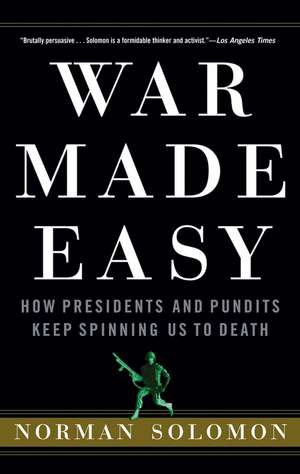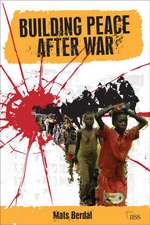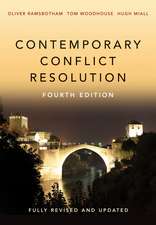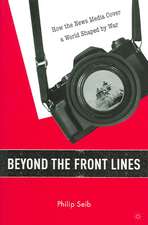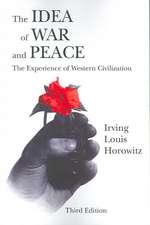War Made Easy: How Presidents and Pundits Keep Spinning Us to Death
Autor Norman Solomonen Limba Engleză Paperback – 23 mai 2006
| Toate formatele și edițiile | Preț | Express |
|---|---|---|
| Paperback (1) | 98.76 lei 22-36 zile | |
| Wiley – 23 mai 2006 | 98.76 lei 22-36 zile | |
| Hardback (1) | 192.86 lei 22-36 zile | |
| Wiley – 18 iun 2005 | 192.86 lei 22-36 zile |
Preț: 98.76 lei
Nou
Puncte Express: 148
Preț estimativ în valută:
18.90€ • 19.78$ • 15.73£
18.90€ • 19.78$ • 15.73£
Carte disponibilă
Livrare economică 10-24 martie
Preluare comenzi: 021 569.72.76
Specificații
ISBN-13: 9780471790013
ISBN-10: 047179001X
Pagini: 314
Dimensiuni: 157 x 236 x 23 mm
Greutate: 0.4 kg
Editura: Wiley
Locul publicării:Hoboken, United States
ISBN-10: 047179001X
Pagini: 314
Dimensiuni: 157 x 236 x 23 mm
Greutate: 0.4 kg
Editura: Wiley
Locul publicării:Hoboken, United States
Descriere
"A sobering and essential book that Americans should read, share, and discuss."
JOHN STAUBER, coauthor of Weapons of Mass Deception You′ve heard it all before, and you will no doubt hear it again. "Our leaders will do everything they can to avoid war." "They attacked us." "Our enemy is a modern–day Hitler." "This is all about human rights." And, at some point after these and other pronouncements had echoed through the media for weeks or months, American troops marched into Vietnam, Panama, or Iraq.
In War Made Easy, Norman Solomon cuts through the dense web of spin to probe and scrutinize the key "perception management" techniques that have played huge roles in the promotion of American wars in recent decades. In addition to documenting a long series of deliberate misdeeds at the highest levels of power, it lays out important guidelines to help us distinguish elements in a propaganda campaign from actual news reporting. By following these simple suggestions, every citizen can become a savvy media critic and, perhaps, help the nation avoid the next costly and unnecessary war.
"An engaging book that helps explain how the myth–making machine works."
The Texas Observer
"If you want to help prevent another war (Iran? Syria?), read War Made Easy now. This is a stop–the–presses book filled with mind–blowing facts about Washington′s warmongers who keep the Pentagon budget rising."
JIM HIGHTOWER, author of Let′s Stop Beating Around the Bush
"A definitive historical text . . . an indispensable record of the real relationships among government authorities and media outlets."
The Humanist
"Our media has a history of enabling Washington′s foreign misadventures. Perhaps if enough people read and act on this book, it won′t be so easy next time."
MARK HERTSGAARD, author of On Bended Knee: The Press and the Reagan Presidency
JOHN STAUBER, coauthor of Weapons of Mass Deception You′ve heard it all before, and you will no doubt hear it again. "Our leaders will do everything they can to avoid war." "They attacked us." "Our enemy is a modern–day Hitler." "This is all about human rights." And, at some point after these and other pronouncements had echoed through the media for weeks or months, American troops marched into Vietnam, Panama, or Iraq.
In War Made Easy, Norman Solomon cuts through the dense web of spin to probe and scrutinize the key "perception management" techniques that have played huge roles in the promotion of American wars in recent decades. In addition to documenting a long series of deliberate misdeeds at the highest levels of power, it lays out important guidelines to help us distinguish elements in a propaganda campaign from actual news reporting. By following these simple suggestions, every citizen can become a savvy media critic and, perhaps, help the nation avoid the next costly and unnecessary war.
"An engaging book that helps explain how the myth–making machine works."
The Texas Observer
"If you want to help prevent another war (Iran? Syria?), read War Made Easy now. This is a stop–the–presses book filled with mind–blowing facts about Washington′s warmongers who keep the Pentagon budget rising."
JIM HIGHTOWER, author of Let′s Stop Beating Around the Bush
"A definitive historical text . . . an indispensable record of the real relationships among government authorities and media outlets."
The Humanist
"Our media has a history of enabling Washington′s foreign misadventures. Perhaps if enough people read and act on this book, it won′t be so easy next time."
MARK HERTSGAARD, author of On Bended Knee: The Press and the Reagan Presidency
Textul de pe ultima copertă
"A sobering and essential book that Americans should read, share, and discuss."
JOHN STAUBER, coauthor of Weapons of Mass Deception You′ve heard it all before, and you will no doubt hear it again. "Our leaders will do everything they can to avoid war." "They attacked us." "Our enemy is a modern–day Hitler." "This is all about human rights." And, at some point after these and other pronouncements had echoed through the media for weeks or months, American troops marched into Vietnam, Panama, or Iraq.
In War Made Easy, Norman Solomon cuts through the dense web of spin to probe and scrutinize the key "perception management" techniques that have played huge roles in the promotion of American wars in recent decades. In addition to documenting a long series of deliberate misdeeds at the highest levels of power, it lays out important guidelines to help us distinguish elements in a propaganda campaign from actual news reporting. By following these simple suggestions, every citizen can become a savvy media critic and, perhaps, help the nation avoid the next costly and unnecessary war.
"An engaging book that helps explain how the myth–making machine works."
The Texas Observer
"If you want to help prevent another war (Iran? Syria?), read War Made Easy now. This is a stop–the–presses book filled with mind–blowing facts about Washington′s warmongers who keep the Pentagon budget rising."
JIM HIGHTOWER, author of Let′s Stop Beating Around the Bush
"A definitive historical text . . . an indispensable record of the real relationships among government authorities and media outlets."
The Humanist
"Our media has a history of enabling Washington′s foreign misadventures. Perhaps if enough people read and act on this book, it won′t be so easy next time."
MARK HERTSGAARD, author of On Bended Knee: The Press and the Reagan Presidency
JOHN STAUBER, coauthor of Weapons of Mass Deception You′ve heard it all before, and you will no doubt hear it again. "Our leaders will do everything they can to avoid war." "They attacked us." "Our enemy is a modern–day Hitler." "This is all about human rights." And, at some point after these and other pronouncements had echoed through the media for weeks or months, American troops marched into Vietnam, Panama, or Iraq.
In War Made Easy, Norman Solomon cuts through the dense web of spin to probe and scrutinize the key "perception management" techniques that have played huge roles in the promotion of American wars in recent decades. In addition to documenting a long series of deliberate misdeeds at the highest levels of power, it lays out important guidelines to help us distinguish elements in a propaganda campaign from actual news reporting. By following these simple suggestions, every citizen can become a savvy media critic and, perhaps, help the nation avoid the next costly and unnecessary war.
"An engaging book that helps explain how the myth–making machine works."
The Texas Observer
"If you want to help prevent another war (Iran? Syria?), read War Made Easy now. This is a stop–the–presses book filled with mind–blowing facts about Washington′s warmongers who keep the Pentagon budget rising."
JIM HIGHTOWER, author of Let′s Stop Beating Around the Bush
"A definitive historical text . . . an indispensable record of the real relationships among government authorities and media outlets."
The Humanist
"Our media has a history of enabling Washington′s foreign misadventures. Perhaps if enough people read and act on this book, it won′t be so easy next time."
MARK HERTSGAARD, author of On Bended Knee: The Press and the Reagan Presidency
Cuprins
Prologue: Building Agendas for War. 1. America Is a Fair and Noble Superpower.
2. Our Leaders Will Do Everything They Can to Avoid War.
3. Our Leaders Would Never Tell Us Outright Lies.
4. This Guy Is a Modern–Day Hitler.
5. This Is about Human Rights.
6. This Is Not at All about Oil or Corporate Profits.
7. They Are the Aggressors, Not Us.
8. If This War Is Wrong, Congress Will Stop It.
9. If This War Is Wrong, the Media Will Tell Us.
10. Media Coverage Brings War Into Our Living Rooms.
11. Opposing the War Means Siding with the Enemy.
12. This Is a Necessary Battle in the War on Terrorism.
13. What the U.S. Government Needs Most Is Better PR.
14. The Pentagon Fights Wars as Humanely as Possible.
15. Our Soldiers Are Heroes, Theirs Are Inhuman.
16. America Needs the Resolve to Kick the "Vietnam Syndrome."
17. Withdrawal Would Cripple U.S. Credibility.
Afterword.
Notes.
Acknowledgments.
Index.
2. Our Leaders Will Do Everything They Can to Avoid War.
3. Our Leaders Would Never Tell Us Outright Lies.
4. This Guy Is a Modern–Day Hitler.
5. This Is about Human Rights.
6. This Is Not at All about Oil or Corporate Profits.
7. They Are the Aggressors, Not Us.
8. If This War Is Wrong, Congress Will Stop It.
9. If This War Is Wrong, the Media Will Tell Us.
10. Media Coverage Brings War Into Our Living Rooms.
11. Opposing the War Means Siding with the Enemy.
12. This Is a Necessary Battle in the War on Terrorism.
13. What the U.S. Government Needs Most Is Better PR.
14. The Pentagon Fights Wars as Humanely as Possible.
15. Our Soldiers Are Heroes, Theirs Are Inhuman.
16. America Needs the Resolve to Kick the "Vietnam Syndrome."
17. Withdrawal Would Cripple U.S. Credibility.
Afterword.
Notes.
Acknowledgments.
Index.
Notă biografică
NORMAN SOLOMON is a nationally syndicated columnist and the Executive Director of the Institute for Public Accuracy. He has appeared on many television and radio news programs and is the coauthor of Target Iraq: What the News Media Didn′t Tell You.
Recenzii
Media critic Solomon (Target Iraq: What the News Media Didn′t Tell You) looks at the pro–war propaganda generated by the U.S. government during military interventions, emphasizing the influence of the media upon public opinion. He begins in 1965, when President Johnson crafted public messages as he sent troops to the Dominican Republic. Solomon claims that LBJ′s handling of this invasion established the prototype for a media agenda employed by subsequent presidents to create public approval for their actions. He finds several formulaic messages that help persuade the public to support military intervention. These include portraying America as a fair and noble superpower, whose honest leaders work hard to avoid war, and the enemy leader as an aggressive, Hitler–like violator of human rights who will do much harm unless the United States intervenes. Solomon′s timely analysis, which continues through the current war in Iraq, provides the public, analysts, and journalists with useful tips on how to evaluate the prewar messages of any administration, current or historical. Of interest to both public and academic libraries.–Judy Solberg, George Washington Univ. Libs., Washington, DC (Library Journal, July 15, 2005) "An engaging book that helps explain how the myth–making machine works." (The Texas Observer, July 8, 2005)
"Brutally persuasive...a must–read for those who would like greater context with their bitter morning coffee, or to arm themselves for the debates about Iraq that are still to come." (Los Angeles Times, June 29, 2005)
"An engaging book that helps explain how the myth–making machine works." (The Texas Observer, July 8, 2005) "Brutally persuasive...a must–read for those who would like greater context with their bitter morning coffee, or to arm themselves for the debates about Iraq that are still to come." (Los Angeles Times, June 29, 2005)
"Brutally persuasive...a must–read for those who would like greater context with their bitter morning coffee, or to arm themselves for the debates about Iraq that are still to come." (Los Angeles Times, June 29, 2005)
"An engaging book that helps explain how the myth–making machine works." (The Texas Observer, July 8, 2005) "Brutally persuasive...a must–read for those who would like greater context with their bitter morning coffee, or to arm themselves for the debates about Iraq that are still to come." (Los Angeles Times, June 29, 2005)
